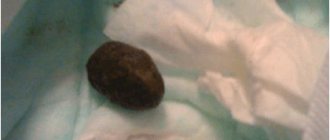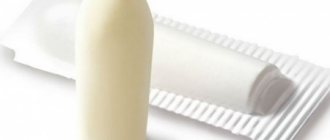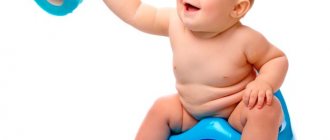It is not unreasonable to consider mother's milk to be the most useful product for the development and growth of a baby. However, in the life of every child there comes a time when, due to certain circumstances, his diet is replenished with new products. The children's digestive system is not always able to cope with the introduction of complementary foods and adapted milk formulas into the menu. Constipation in a baby with mixed feeding, this is exactly the problem every second family raising a child faces. Parents are worried and ask reasonable questions: “Why did this happen?” and “What should I do?”
Signs of constipation in a newborn
The number of bowel movements in infants is a purely individual concept. Some babies poop after every feeding, others once a day. But if the child feels normal, does not suffer from stomach pain, and the stool has a consistency typical for this age category, then there is no reason to worry.
If your baby's stool is irregular, the stool is too hard, and every bowel movement is accompanied by crying, then it's time to sound the alarm. All these are symptoms of real constipation in a newborn baby with mixed feeding. And if emergency measures are not taken at this stage, then most likely, long and serious treatment will soon be required.
Note. In breastfed babies, the absence of stool for several days is considered to be the norm. This only means that mother’s milk is ideal for the baby, and his stomach is able to completely digest such food. But if a child, in addition to mother’s milk, receives all kinds of supplements, in the form of adapted milk formulas or baby food, then daily bowel movements are a necessity.
However, before you begin to eliminate the symptoms of this delicate problem, you need to understand what the main causes of constipation are.
Symptoms of constipation in newborns
Bloating in an infant is a symptom of constipation.
Symptoms of constipation in infants appear almost immediately.
- Difficulty trying to defecate . The baby pushes for a long time, blushes, and often begins to cry;
- Rare bowel movements . If a child does not walk “at large” for more than a day and at the same time experiences obvious discomfort, then he probably has constipation;
- if the baby still manages to go to the toilet, then his feces are released in very small quantities and have a very hard consistency ;
- loss of appetite;
- nausea or vomiting;
- bloating and abdominal pain;
- sleep disorders.
Constipation can occur in infants who are breastfed and in those who are fed formula.
If, when feeding with mother's milk, the baby's intestinal function can recover on its own, then with artificial feeding, the use of additional means to combat constipation is often required.
How to help your baby?
Faced with the problem of childhood constipation, parents make every effort to alleviate the suffering of the baby. But very often, adults lack even the most basic knowledge in this area. So what should you do if your baby has not had a bowel movement for 48 hours?
Firstly, you should completely abandon “proven folk methods”, which can often be gleaned from various forums for young parents. You should not insert a piece of laundry soap into the child’s rectum, or irritate its walls with the tip of a thermometer. Of course, such actions can indeed achieve the desired effect, but the consequences that such treatment leads to can be absolutely harmless.
If you really think that it is necessary to influence the walls of the rectum from the outside, purchase a gas outlet tube . However, its use cannot become a daily ritual. After all, this can balance the work of the intestines so much that the process of defecation without its use will become impossible.
What means are prohibited to use?
The dominant principle in the treatment of constipation in newborns is the harmlessness of the drugs used.
- When a child switches from breastfeeding to mixed or artificial feeding, bowel movements may be delayed for several days, and the color and consistency of stool may change. The delay does not require treatment; the body needs to be given time to adjust to the new diet. Medicines can interfere with this process.
- It is forbidden to independently use laxatives for a newborn child for severe constipation, taken orally.
- Forget about home and folk methods of causing a bowel movement in a child by irritating the rectum with the tip of a thermometer or syringe. You cannot use candles made from laundry soap, or make various enemas from kefir, soda solution, or mother's milk. This can lead to injury to the rectum and disrupt the natural intestinal microflora.
- The use of microenemas and suppositories is carried out once, not on an ongoing basis. If the suppository did not help, the child was unable to defecate, do not continue self-treatment, call the pediatrician.
- If your child has a hard, swollen tummy, constipation for more than two days, or is lethargic and tearful, you should immediately consult a doctor. A diagnosis of intestinal obstruction is possible.
- Children under one year of age are prohibited from being prescribed saline or osmotic drugs, oil-based laxatives, and medications that are absorbed through the blood.
What information is missing from the article?
- More reviews of effective products
- Products that will help with the problem
- How to avoid constipation
- How to relieve pain
Syrup with lactulose
Another product that you can purchase at a pharmacy without a doctor's prescription is lactulose syrup. This medicine is produced by pharmaceutical companies around the world under various names. Today you can buy both imported samples and products from domestic manufacturers, whose pricing policy is more acceptable to consumers, and whose quality and efficiency are no worse.
Lactulose syrup helps increase the volume of stool. As a result, they begin to put pressure on the intestinal walls, which leads to activation of the bowel movement process.
You've probably noticed that dairy products containing lactulose have appeared on store shelves. This is completely harmless to the human body, and has only a positive effect on the functioning of the digestive system.
You can use lactulose syrup for several years without observing any side effects. Please note that in the first days of taking this drug, active formation of gases in the stomach is observed. An infant can be very bothered by colic and gas accumulation. The same gas outlet tube can help in this case.
The instructions for the syrup indicate the daily intake for children under one year of age in the amount of 5 ml. However, you should not start taking it with this volume. Start with 1 ml and gradually increase the dose to the one indicated in the annotation. Gradual introduction will save the baby from unnecessary suffering.
Incorrectly selected medications
If you cannot get rid of constipation using syrup with lactulose and suppositories with glycerin, then this is a signal to immediately contact your local physician. Of course, you can purchase specialized laxatives based on the advice of the pharmacist at the pharmacy. But children's doctor Komarovsky recommends not listening to such advice. After all, despite the literacy and awareness of a pharmacy worker, it is not always possible to make the right choice.
Laxatives have a fundamentally different method of action. Some of them enhance intestinal motility and accelerate the movement of feces. Others contribute to the retention of moisture in the intestines, as a result of which the feces increase in volume and irritate the intestinal walls, and cause the process of defecation.
And if the baby’s difficulties with emptying are associated precisely with a lack of moisture, then drugs that enhance peristalsis will not only not have the desired effect, but will also lead to injuries to the walls of the anus and intestines. And instead of the expected relief, the baby will experience severe pain and discomfort. Therefore, if you do not have sufficient knowledge and a complete clinical picture, go to see a doctor.
Review of products for newborns
Analyze your diet if you are breastfeeding. During lactation, the mother needs to follow a diet and exclude allergenic and fixative foods. Use more fiber and olive oil in your diet so that the process of feeding a baby is stress-free for both.
Regardless of what type of feeding the baby is on, add a few teaspoons of water to the baby.
You can give dill water; herbal mixtures are sold in children's departments.
If the baby is calm, active, the tummy is not tense and not swollen, give the newborn a belly massage for constipation. A pleasant procedure will provide physiological and psychological comfort to the baby from the mother’s affectionate touches. Intestinal peristalsis is activated, stool moves faster to the exit. Using gentle circular movements clockwise, stroke the tummy with your palm. Using movements, we draw the letter P, pressing the palm at each point. Press your legs against your tummy several times. We place the baby on his tummy. We stroke from the neck to the buttocks. Massage should not be performed after feeding, when the newborn is capricious and not in the mood. The procedure is considered an excellent prevention of gastrointestinal problems. Spend no more than 10 minutes per session every day.
We recommend reading
- Which doctor should I contact for constipation in adults?
- Can soap be used for constipation: everything you need to know
- Laxative for breastfeeding to treat constipation
Suppositories with glycerin or sea buckthorn oil have a gentle relaxing effect on the rectum. They are affordable, natural and safe for small children. Before you decide to give your child an enema, try using laxative suppositories first. Packaging is available for adults and children. If you have candles for adults, cut off an eighth for a newborn; for older ones, increase the volume twice. After administration, the candle begins to melt, releasing the active substances. The product quickly helps, having an irritating effect on the rectum.
At your appointment, your pediatrician will recommend medications to treat constipation. Medicines for infants:
- candles,
- syrups,
- solutions.
| Microlax enemas | An effective drug for constipation, helps cleanse the intestines. Contains sodium salt, which causes osmotic imbalance. Water binds in the rectum and pushes the stool toward evacuation, further softening it. Glycerin promotes painless bowel movements. Defecation occurs within 5–15 minutes. Enemas are indicated for children from birth. The active substances do not penetrate into the upper intestines. Remove the seal from the tip, press on the tube so that part of the gel comes out. Give children under one year of age half the length of the enema. |
| Duphalac | A safe product, it has a gentle effect on the digestive system, the result of defecation occurs within a day. For infants, take up to 5 ml, preferably at one time. In addition to the laxative effect, it improves intestinal microflora. |
| Normolakt | A medicine identical to Duphalac, based on lactulose. Up to a year, take from 2.5 to 5 ml. The daily dose should be given to the child in the morning. Can be mixed with juices and purees. If loose stools begin, the drug should be discontinued. |
| Prelax | Effectively relaxes the intestines, preventing chronic constipation. Not addictive. Take 5 to 30 ml twice a day before feeding. The effect occurs within an hour. These drugs are based on lactulose and vary in manufacturer and cost. Duphalac's cost is higher. |
| Forlax | It differs from the previous ones in composition. You can start using it after six months. The composition includes polyethylene glycol, the molecules of which bind water and promote the excretion of feces. Prescribed to children from 6 months to one year, one sachet per day. Dissolve the contents of the sachet in warm boiled water. It should be added that Forlax is a symptomatic drug that does not eliminate the causes of constipation. |
Lactulose (commercial names: Duphalac, Normolakt, Prelax) is considered an ideal treatment for functional constipation in young children. The syrups taste good, the child drinks with pleasure.
For constipation in a newborn and up to one month old, start treatment with non-drug medications. Tummy massage, dill water, fennel decoction, glycerin suppositories. Children in the first month of life can have up to four bowel movements per day, but with age their number and frequency decrease.
In a three-month-old baby, the consistency of stool changes, it becomes denser and more pronounced. If the contents of the bowel movement are dense and blood clots are noticeable, this indicates constipation.
At the age of four months, the baby begins to give the first complementary foods. Changes in diet often lead to stool retention. You need to drink more water, at least 80 ml, laxative beetroot, apple, vegetable puree or apple juice a couple of spoons. Ride a fitball to stimulate the abdominal muscles, massage your tummy.
Constipation in seven-month-old breastfed children is associated with a violation of the mother's diet, as well as improper complementary feeding. Sometimes they appear as a result of suppression of reflex connections, a decrease in the contractile function of the rectum. Normally, a seven-month-old baby should defecate several times a day.
The above remedies cope with symptomatic, secondary causes of constipation in children. Pediatricians recommend Bifidumbacterin to parents to improve intestinal function and normalize its microflora. It has a delicate effect on the digestive system, populating it with beneficial bacteria, preventing the development of pathogenic organisms, and strengthening the immune system. You can take it from birth, there are no age restrictions. Before you start taking it, consult your doctor about the required dosage of the drug.
Bloating, intestinal cramps, and colic are common companions in the first months of life, even in practically healthy children. If it is difficult to pass gases, you can use a gas outlet tube lubricated with petroleum jelly.
One scoop of Espumisan can remove gas accumulations in the intestines and relieve the child from pain.
Is gymnastics necessary?
Don't forget about gymnastic exercises. Komarovsky focuses the attention of mothers on the fact that physical procedures are very important for the baby. They help activate the digestive system.
There are enough newborns and one-month-old babies:
- stroking the tummy and back;
- laying on the tummy;
- do exercise bike.
A two- and three-month-old baby can already be involved in joint exercises on a fitball. Exercises on a big ball are incredibly exciting and all kids enjoy doing them.
Try to distribute the daily routine so that physical activity does not disrupt the baby’s usual schedule. It is best if you do physical exercises with your baby no earlier than 2 hours after feeding.










